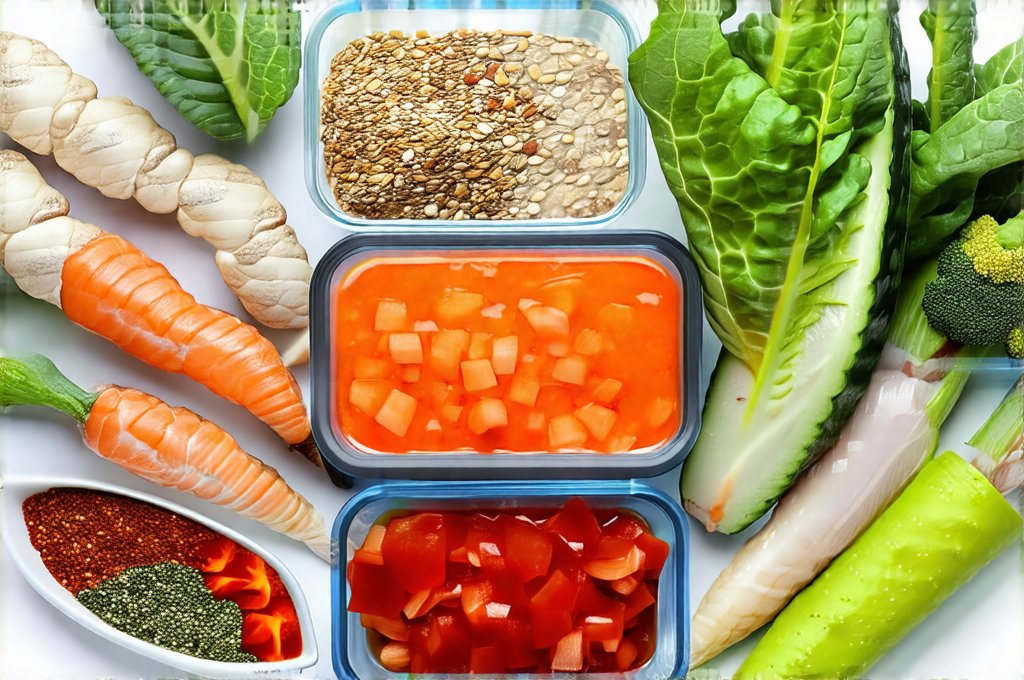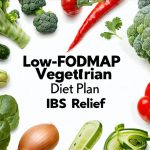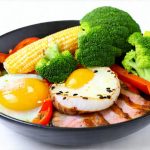Gastroesophageal reflux disease (GERD), characterized by persistent heartburn and acid regurgitation, can significantly impact quality of life. Many individuals find that dietary modifications are crucial in managing their symptoms. A vegetarian diet, often lauded for its health benefits, requires careful consideration when navigating GERD, as certain plant-based foods can exacerbate reflux while others offer soothing relief. This is further complicated by the need to maintain adequate protein intake, which is vital for overall health and well-being but sometimes perceived as limited within a strictly vegetarian framework. Successfully managing GERD on a vegetarian diet necessitates understanding food triggers, prioritizing easily digestible options, and incorporating sufficient protein sources that are gentle on the digestive system.
This article delves into creating a practical and sustainable meal plan specifically designed for vegetarians experiencing GERD. We’ll explore which plant-based foods to embrace and avoid, how to optimize your meals for minimal reflux, and importantly, provide viable protein alternatives beyond traditional meat sources. The goal isn’t restriction but rather informed choices that allow you to enjoy a flavorful and nourishing vegetarian diet without the discomfort of GERD symptoms. It is important to note that individual sensitivities vary greatly; what triggers one person may not affect another. Listening to your body and adjusting the plan accordingly is key. You might even find it helpful to begin with an easy 7-day acid reflux meal plan as a starting point for identifying trigger foods.
Understanding Vegetarian Diets & GERD Triggers
A vegetarian diet, in its broadest sense, excludes meat, poultry, and fish. However, there are various subtypes: lacto-ovo vegetarians consume dairy and eggs; lacto-vegetarians eat dairy but not eggs; ovo-vegetarians eat eggs but no dairy; and vegans exclude all animal products. Each variation impacts the potential sources of protein and other nutrients available. When it comes to GERD, certain aspects common in many vegetarian diets can be problematic. – High fiber intake, while generally healthy, can increase gas production and pressure on the lower esophageal sphincter (LES), potentially leading to reflux. – Fatty foods, even plant-based fats like avocados or nuts in large quantities, slow down stomach emptying, increasing the risk of acid production. – Acidic fruits and vegetables such as tomatoes and citrus fruits can directly irritate the esophagus. – Spicy foods, often used to enhance flavor in vegetarian cuisine, are well-known GERD triggers for many.
The key isn’t necessarily eliminating these foods entirely but rather understanding your personal tolerance levels and incorporating them strategically. Portion control is crucial. Smaller, more frequent meals generally put less strain on the LES than large, infrequent ones. Moreover, cooking methods matter; steaming, baking, or grilling are preferable to frying, which adds unnecessary fat content. Avoiding late-night eating allows ample time for digestion before lying down, reducing the likelihood of nighttime reflux. A crucial element is identifying your personal trigger foods – keep a food diary to track what you eat and any resulting symptoms. Learning how to create a weekly GERD meal prep plan can make this process much easier and more manageable.
Building a GERD-Friendly Vegetarian Meal Plan
A successful GERD meal plan focuses on easily digestible foods that minimize acid production and esophageal irritation. This means prioritizing non-acidic fruits (like bananas, melons, pears), vegetables (such as green beans, broccoli, cauliflower – but in moderation due to fiber), and whole grains (oatmeal, brown rice). Lean protein sources are essential for maintaining muscle mass and overall health. Tofu, tempeh, and edamame are excellent choices, provided they’re prepared without excessive oil or spices. Lentils and beans offer affordable protein but can cause gas in some individuals; soaking them overnight and cooking thoroughly helps reduce this effect. Dairy products, if tolerated, should be low-fat options.
Hydration is also vital. Water helps neutralize stomach acid and aids digestion. Herbal teas like chamomile or ginger (in moderation) may soothe the digestive system. Avoid carbonated beverages, caffeine, alcohol, chocolate, and peppermint, all known GERD triggers. Meal timing plays a significant role – aim to eat your last meal at least 2-3 hours before bedtime. Consider elevating the head of your bed slightly to help prevent nighttime reflux. Remember that this is a personalized process; experiment with different foods and combinations to determine what works best for you. If you struggle with dairy, exploring best dairy alternatives can be incredibly helpful in crafting your meal plan.
Protein Alternatives & Considerations
Finding adequate protein on a GERD-friendly vegetarian diet can be challenging, but several options exist.
- Tofu: This soybean curd offers versatility in cooking and is generally well-tolerated. Choose firm or extra-firm tofu and avoid deep frying it. Marinating with mild herbs like dill or parsley adds flavor without exacerbating GERD symptoms.
- Tempeh: Made from fermented soybeans, tempeh boasts a slightly nuttier flavor and firmer texture than tofu. Fermentation also aids digestion for some individuals. Again, gentle preparation methods are key.
- Lentils & Beans: While potentially gas-producing, these legumes provide a significant protein boost. Soaking and thorough cooking can minimize discomfort. Start with small portions to assess your tolerance. Red lentils tend to be easier to digest than other varieties.
- Quinoa: Technically a seed, quinoa is a complete protein source and easily digestible. It’s naturally gluten-free and versatile in recipes.
Beyond these staples, consider incorporating smaller amounts of nuts and seeds (almonds, chia seeds, flaxseeds) for added protein and healthy fats. Protein powders can be helpful but choose plant-based options carefully – avoid those with additives that may trigger GERD. Pea protein is generally well-tolerated. It’s also important to remember the concept of protein combining. While not strictly necessary, pairing incomplete proteins (like rice and beans) ensures you obtain all essential amino acids. Be mindful of potential gut irritation; why protein powders with additives can cause discomfort, and choose wisely.
Meal Timing & Portion Control Strategies
Effective meal management is paramount for minimizing GERD symptoms. – Smaller, more frequent meals are easier on the digestive system than large portions. Aim for 5-6 small meals throughout the day instead of three large ones. This reduces pressure on the LES and minimizes acid production. – Avoid eating within 2-3 hours of bedtime. Allowing sufficient time for digestion before lying down significantly lowers the risk of nighttime reflux. – Chew food thoroughly. Proper chewing aids digestion and reduces the workload on your stomach. – Eat slowly. Rushing through meals can lead to indigestion and bloating.
Portion control is equally crucial. Even GERD-friendly foods can cause problems in excess. Pay attention to serving sizes, especially with high-fiber options like beans or lentils. Avoid overeating, even if the food itself doesn’t typically trigger symptoms. Consider using smaller plates to help regulate portion sizes. Finally, pay close attention to your body’s signals. If a particular food causes discomfort, even in small quantities, eliminate it from your diet and monitor how you feel. For those with dairy sensitivity, fermented alternatives to yogurt can provide a probiotic boost without the discomfort.
Lifestyle Modifications for Enhanced Relief
Dietary changes are often the first line of defense against GERD, but lifestyle adjustments can provide significant additional relief. – Maintain a healthy weight. Excess weight puts pressure on the abdomen and LES, increasing reflux risk. – Quit smoking. Smoking weakens the LES and increases stomach acid production. – Limit alcohol consumption. Alcohol relaxes the LES and irritates the esophagus. – Manage stress. Stress can exacerbate GERD symptoms; practice relaxation techniques like yoga or meditation. – Elevate the head of your bed. Raising the head of your bed by 6-8 inches helps prevent nighttime reflux.
Regular exercise, aside from its overall health benefits, can also aid digestion and reduce stress levels. However, avoid strenuous activity immediately after eating. Finally, remember to consult with a healthcare professional or registered dietitian for personalized advice tailored to your specific needs and medical history. They can help you develop a comprehensive GERD management plan that incorporates dietary modifications, lifestyle changes, and potentially medication if necessary. A well-planned approach, such as building a gut-friendly meal plan, can make all the difference in managing your GERD symptoms effectively.


















